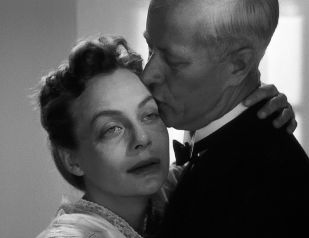« Lights in the Dusk | Main | Django »
September 05, 2007
A few words about Carl Dreyer

Day of Wrath/Vredens Dag
Carl Theodor Dreyer - 1943

Ordet/The Word
Carl Theodor Dreyer - 1955
both Criterion Collection Region 1 DVD
Even though I have pretty much made up my mind on the favorite foreign language films I would be voting for, I still felt it important to see the films others had chosen. I had avoided seeing Carl Dreyer's films in part because what I had read made his films seem like chores to sit through. Herman Weinberg actually did Dreyer no favors with his constant harangues about how Robert Altman or John Schlesinger could get millions to make another movie while poor Carl Theodor had to scrape by, as if they were financed from the same pool. I might have seen Day of Wrath and Ordet a lot sooner if someone had mentioned that Carl Dreyer had a sense of humor, used to sly effect in his films.
The contrarian in me does think that if Carl Dreyer wasn't so intent on being an artist, he could have done well in Hollywood. The big shadows and general gothic look of Day of Wrath isn't too distant from the look of Universal horror films of the Thirties and Forties. The sexual tension in Day of Wrath, even the narrative of a woman who may or may not really be a witch, is similar to the stuff of Val Lewton's horror films. In a very roundabout way, one can connect Day of Wrath to Jacques Tourneur's Cat People by way of Paul Schrader, who wrote about Dreyer in his book, Transcendental Style in Film, and filmed a remake of Cat People. As for Ordet, considering how the film ends, bringing dead wives back to life was the basic plot of two of the Corman/Poe films.

More seriously, what is interesting about the two films is the examination of faith as a devisive, as well as unifying force. Unlike some of the more recent films which present faith as a given, that falls within certain parameters, Dreyer acknowledges that nothing is obvious, and that there are no easy answers. No one may be entirely right, or wrong. Instead, Dreyer seems to acknowledge that his characters are all sincere about their respective beliefs in Ordet. The flip side is that manipulation of faith destroys the characters of Day of Wrath.
What is also interesting about Ordet is that even though it takes place well into the 20th Century, the characters live not too differently from earlier eras. The hand crank telephone and the automobile, heard but not seen, almost seem to be anachronisms.
Even though two older men almost come to blows, for the most part, discussions of faith allow characters to agree to disagree in Ordet. Seen in terms other films, especially The Passion of Joan of Arc, Dreyer's men seem to be more prone to dogmatic thinking, while the women are more flexible in how they feel faith can be expressed. The farmer's son in Ordet, who thinks he is Jesus, provides a comic commentary on both the activities in the film as well as how faith can be literally interpreted. After an unexplained absence, the son reappears, apparently himself and no longer claiming to be Jesus. That the dead woman comes back to life following his prayer indicates that, at least for Dreyer, maybe the son could have been Jesus reborn as the son of a Danish farmer.
What makes both films interesting also is that Dreyer is purposefully ambiguous so that there is no correct interpretation. It is as if Dreyer knew that by making films that took place in a past that could in some ways reflect upon present day concerns, without being too specific, that his films would still be meaningful to those who took the time to see them in the future.

Posted by Peter Nellhaus at September 5, 2007 12:45 AM
Comments
Excellent films...and, yes, humor to boot. My favorite Dreyer has always been his last, Gertrud, in which lovers dance around words and feelings, never looking one another in the eye -- a fascinating visual gimmick.
Posted by: Flickhead at September 5, 2007 09:39 AM
I have not seen Ordet, but I really like Day of Wrath. You're very right about the "gothic horror" elements and dark humor found in his films and the comparison to stuff in Val Lewton's horror films is an interesting one. I think the horror/fantasy aspect found in his films is what draws me to them. My favorite Dreyer film is Vampyr.
Posted by: Kimberly at September 5, 2007 07:27 PM
